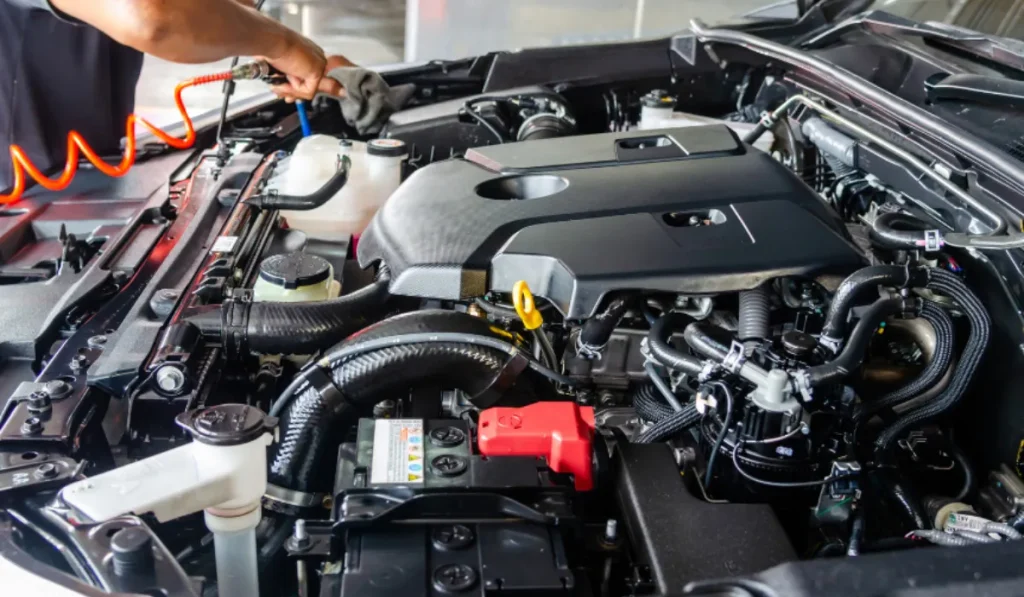A car engine typically weighs between 150 and 600 pounds (68 to 272 kilograms). The weight varies depending on the engine type, size, and number of cylinders.
Understanding the weight of a car engine is crucial for both vehicle manufacturing and maintenance.
The mass of an engine influences the overall weight distribution and performance of a vehicle. Compact cars usually have lighter, smaller engines designed for efficiency, while performance vehicles boast heavier, more powerful engines.
Truck engines may be even heavier due to the demands of hauling and towing. Mechanics must consider engine weight during installations and repairs to ensure appropriate handling and safety measures.
Car buyers also benefit from this knowledge, as engine weight impacts fuel economy and driving dynamics.
This information serves as an integral aspect of automotive design and operation, resonating with car enthusiasts and industry professionals alike.

Heart Of The Beast: Car Engine Weights
Car engines are amazing machines. They power our vehicles and come in different shapes and sizes.
Knowing how much a car engine weighs is not just trivia. It’s crucial for mechanics and car enthusiasts alike. Let’s dive into the world of car engines and discover the weight of these metal hearts.
Diversity In Engine Types And Sizes
Car engines vary widely. Their weight depends on their type and size. Below, we categorize common engine types by weight.
- Inline 3-cylinder: Small and efficient, typically around 200-300 lbs.
- Inline 4-cylinder: Commonly found in compact cars, weights range from 300-400 lbs.
- V6 engines: Offer more power, and weigh between 400-450 lbs.
- V8 engines: Known for performance, average weight hovers around 500-700 lbs.
- Electric motors: weigh significantly less, often under 300 lbs.
Standard Weights Across Different Car Models
While engine weights differ, some standards exist. Here’s a look at average weights across car models.
| Car Type | Engine Weight (lbs) |
|---|---|
| Compact Cars | 300-400 |
| Sedans | 350-450 |
| SUVs | 450-600 |
| Pickup Trucks | 500-750 |
| Sports Cars | 400-600 |
Diesel engines tend to be heavier due to their robust construction. An average diesel engine can weigh from 700 lbs up to 2,500 lbs for larger vehicles like trucks.
Factors Influencing Engine Weight

Understanding how heavy a car engine is can be crucial. Many factors decide an engine’s weight.
These include materials, size, and extra parts. Let’s explore what affects engine weight most.
Material Composition: Aluminum Vs. Cast Iron
Engine blocks can be cast iron or aluminum. Each material has different weights and advantages.
Aluminum is lighter, which reduces weight but may not be as durable. In contrast, cast iron is heavier but offers better longevity.
- Aluminum engines are common in modern cars for their lightness.
- Cast iron engines are found in larger vehicles needing strength.
Engine Displacement And Cylinder Count
The size of an engine, or its displacement, impacts weight. More cylinders usually mean more mass. A 4-cylinder engine is typically lighter than a V8.
| Cylinder Count | Approximate Weight Range |
|---|---|
| 4-Cylinder | 300-400 lbs |
| 6-Cylinder | 400-600 lbs |
| V8 | 500-700 lbs |
Add-ons And Accessories
Extras like turbos, superchargers, and other parts add to engine weight. Even small additions can mean extra pounds. Emissions equipment can also add weight.
- Superchargers and turbos can increase power and weight.
- Emission controls are necessary but add bulk.
The Scale Of Engine Heft
Imagine holding a car engine. Sounds tough, doesn’t it? Car engines are the heart of the vehicle and come in different weights.
The weight depends on the type, size, and materials used. Let’s dive into the average weights and compare different engine types.
Average Weight Benchmarks For Modern Engines
Car engines vary in weight based on their purpose and design. Here’s a look at some average weights:
- Compact cars: Engines weigh around 150 to 400 pounds
- Sedans: Engines can tip the scales at 300 to 600 pounds
- SUVs and trucks: Expect 400 to 700 pounds and up
High-performance sports cars or luxury vehicles may have heavier engines due to added complexity. Let’s compare the lightweights to the heavyweights now.
Comparing Lightweight And Heavy-duty Engines
Materials make a difference in engine weight. Aluminum engines are lighter, while iron blocks pack on the pounds. Here’s a quick comparison:
| Engine Type | Material | Average Weight |
|---|---|---|
| Lightweight Engine | Aluminum | 100 – 300 lbs |
| Heavy-Duty Engine | Iron | 500 – 800 lbs |
Lightweight engines are common in most modern cars. They improve fuel efficiency and offer sufficient power.
Heavy-duty engines, found in big trucks and performance vehicles, focus on durability and power.
Impact Of Engine Weight On Vehicle Performance

The weight of a car engine plays a pivotal role in the overall performance of a vehicle. From how the car handles to its fuel consumption and acceleration, the mass of the engine is a critical factor.
A heavier engine can influence various dynamics, altering the driving experience. Let’s delve deeper into how engine weight impacts vehicle performance:
Handling And Weight Distribution
Balanced weight distribution is key for optimal handling. A heavy engine can shift a vehicle’s center of gravity.
This may impact stability and cornering capabilities. Cars equipped with lighter engines tend to handle better, offering a more agile driving experience. Let’s consider some specifics:
- Improved cornering: Lighter engines can improve the precision of turns.
- Better balance: Weight is more evenly spread across the chassis.
- Enhanced stability: Reduced weight at the front enhances control during maneuvers.
Fuel Efficiency And Acceleration
A lighter engine contributes to better fuel economy. It takes less energy to move a lighter vehicle.
This translates into fewer trips to the gas station. Acceleration also benefits from reduced engine weight.
| Engine Weight | Fuel Efficiency | Acceleration |
|---|---|---|
| Lighter | Higher | Faster |
| Heavier | Lower | Slower |
Factors include:
- Reduced drag: Light engines use less fuel to overcome inertia.
- Snappier response: Less mass means quicker speed increases.
- Better mileage: The engine works less, conserving fuel over time.
Trends And Innovations In Reducing Engine Weight
The quest to create lighter cars has always been at the forefront of automotive innovation.
Lighter cars mean better fuel efficiency and performance. In recent years, car manufacturers have focused on reducing the weight of one of the heaviest components: the engine.
Breakthroughs In Material Science
Advances in material science have paved the way for lighter engines. Car makers now use materials that offer high strength without the heaviness of traditional metals. Let’s look at some cutting-edge materials:
- Aluminum: Once used mainly for premium vehicles, aluminum is now a standard in engine production for its lightness.
- Magnesium: This metal can be even lighter than aluminum, though it’s not as widely used due to cost.
- Carbon Fiber: High strength and feather-light, carbon fiber is finding its way into more engine components.
- Composite Plastics: Durable and light, composite plastics are replacing metal in some engine parts.
The result? These materials cut engine weight significantly, aiding in fuel savings and CO2 reductions.
Hybrids And Electric Drivetrains
Conventional engines are heavy, but future engines look different. Hybrid and electric drivetrains are changing the auto industry:
- Hybrid Engines: These combine a conventional engine with electric motors. They are lighter than fully petrol or diesel engines.
- Electric Motors: Electric cars don’t have traditional engines. Their motors are much lighter.
- Battery Technology: Innovations in batteries make electric cars lighter and able to go further on a single charge.
These technologies are reshaping how we think about engines. Cars are becoming lighter, more efficient, and kinder to our planet.
FAQs About the Weight of a Car Engine
What Is The Average Weight Of A Car Engine?
The average weight of a car engine is typically between 300 to 350 pounds (136 to 158 kilograms). However, this can vary depending on the type, size, and materials used in construction.
How Does Engine Size Affect Weight?
Engine size greatly affects weight; larger engines with more cylinders typically weigh more. For instance, a V8 engine will be heavier than a four-cylinder engine due to size and complexity.
Are Diesel Engines Heavier Than Gasoline Ones?
Yes, diesel engines are generally heavier than gasoline engines. This is due to their sturdier construction to withstand higher compression ratios and stresses, resulting in additional weight.
Can The Material Of An Engine Block Affect Its Weight?
Absolutely, the material of an engine block significantly affects its weight. Aluminum blocks are lighter than iron blocks, which can reduce the overall engine weight by as much as 50 pounds.
Conclusion
Wrapping up, the weight of a car engine varies greatly. Typically, it ranges from 300 to 600 pounds.
This knowledge aids in understanding vehicle performance and maintenance. Always consult your vehicle’s manual for specifics. Remember, a well-maintained engine ensures a smooth and safe ride.
Keep informed and drive confidently!
Resources:
https://afdc.energy.gov/vehicles/how-do-gasoline-cars-work
https://www.epa.gov/vehicles-and-engines
